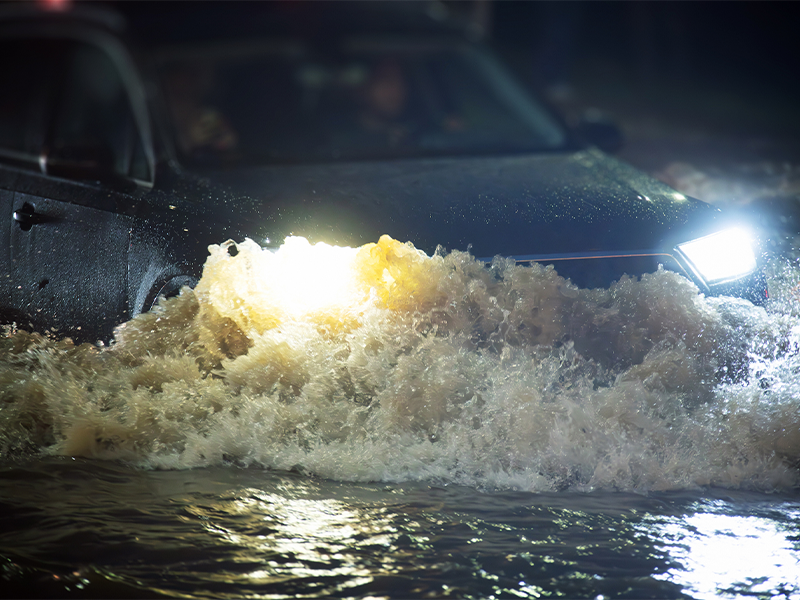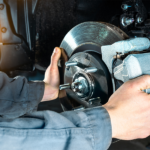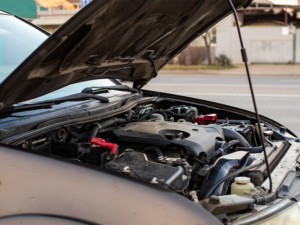
When it rains, it pours. And when it pours… well, your car might take the beating. Water, especially when dirty or salty, can seriously threaten any vehicle’s intricate mechanical and electrical systems. Often, the scope of damage raises a major question for the owner: is it feasible to repair the car? While the answer to this question might look straightforward, things aren’t always as they seem, and to make the right decision, there are a number of factors to consider.
Understanding Flood Damage
Flood damage can severely impact a vehicle’s mechanical systems, often causing lasting issues with the engine, transmission, and drivetrain. Water can mix with oil and other fluids, and reduce their ability to protect the engine and potentially causing it to seize or fail.
Electrical components are especially vulnerable to water. Corrosion can develop quickly, disrupting the car’s wiring and computer systems. Even after the car dries out, electrical shorts and malfunctions may occur, raising safety and reliability concerns.
Flooding also affects the car’s interior, with water soaking into upholstery, carpets, and insulation. If not thoroughly cleaned and dried, mold and mildew can develop, not only damaging the car’s comfort and appearance but also posing health risks.
The vehicle’s structure can also suffer from flood damage. Water exposure can cause rust and weaken metal parts, which reduces the car’s lifespan and compromises safety on the road.
Assessing the Damage
A thorough inspection by a qualified mechanic is needed to accurately assess flood damage. The mechanic will examine the vehicle to determine the extent of the damage, looking at how much water exposure occurred and for how long.
The engine, vehicle transmission, and electrical systems are usually closely monitored. The mechanic will check for water contamination in the oil, inspect the condition of fluids, and test electronic systems for potential failure or short circuits. It’s also important to check the interior. Water can damage seats, carpets, and internal frameworks, so moisture levels will be measured to prevent mold or mildew from developing later.
Meanwhile, the car’s frame and body will be inspected for rust or corrosion that could affect its safety. This includes a careful look at the undercarriage, brake systems, and other areas where moisture may have caused hidden damage.
Repairing a Flood-Damaged Car
Before repairing a flood-damaged car, it’s important to weigh the cost of repairs against the vehicle’s value. Often, extensive damage may make the repairs financially impractical, and an appraisal can help decide if moving forward is worthwhile.
Replacing electrical systems is a major part of the process. A mechanic will determine which components can be saved and which need replacement. However, modern vehicle electronics are complex, and repairs can be both challenging and expensive.
Mechanical systems like the engine and transmission require detailed inspections. In some cases, a full overhaul or replacement of these key parts is necessary, which can be a significant investment.
Restoring the interior goes beyond cleaning. Upholstery and carpeting may need to be removed and replaced to fully eliminate moisture and prevent mold, ensuring the car is safe and comfortable for future use.
Cost Considerations
When deciding whether to repair a flood-damaged car, owners need to compare the repair costs with the vehicle’s current value. In many cases, the repairs may cost more than the car is worth, suggesting it might be better to replace the vehicle than to fix it.
Insurance is a key factor in determining repair affordability. Comprehensive coverage may cover much of the expense, easing the financial strain. Without insurance, however, owners could face high out-of-pocket costs to restore the car.
Beyond immediate repair costs, the long-term effect on the car’s value is important to consider. A vehicle with a history of flood damage usually has a lower resale value. As such, owners might want to explore alternatives like selling the car for parts or trading it in.
Repairing a flood-damaged vehicle often requires specialists with experience in handling water damage. Their expertise can come with higher labor rates though, so, it is necessary to get a clear price estimate before committing to repairs.
Deciding Whether to Repair or Replace
Deciding between repairing or replacing a flood-damaged car involves evaluating the extent of the damage and the cost of repairs. First, owners need to assess how deeply the water affected key systems and components, often with help from mechanics.
They should also get repair estimates and compare them to the vehicle’s current market value. If the cost of repairs is close to or more than the car’s value, replacing the vehicle may be the smarter choice.
Meanwhile, safety must be given priority. A thorough inspection might reveal hidden problems that compromise the car’s safety. As repairs might not ensure full safety, replacement might turn out to be a better option.
Another factor is the car’s long-term reliability after flood damage. Persistent issues with compromised systems could lead to ongoing repairs, and thus, make investing in a new car more practical than fixing the current one.
Preventing Future Flood Damage
To reduce the risk of flood damage to vehicles, owners can take preventive steps like staying informed about weather forecasts and avoiding flood-prone areas for parking or driving. During heavy rain or flood warnings, using elevated parking spots can help protect the vehicle from water damage.
Regular car maintenance, especially for seals, gaskets, and underbody coatings, is also essential. Keeping these components in good shape can reduce the impact of water exposure if the car comes into contact with floodwater.
For added protection, owners can use flood barriers or water-resistant covers, which help deflect water or limit its contact with sensitive vehicle parts during storms or floods.
Finally, flood insurance and comprehensive auto coverage can offer financial protection against water damage. This kind of coverage can make a significant difference in covering repair costs after a flood.
Fresh Out of a Flood?
At Owens 30 North Auto Repair, we specialize in assessing and addressing flood damage with expertise and precision. Our skilled technicians are also dedicated to providing top-notch service to restore your vehicle’s performance and safety. Don’t let flood damage compromise your vehicle’s reliability—contact us today for a thorough evaluation and expert repair solutions.






